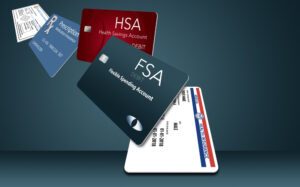Updates on FSAs and HSAs

A recent survey found that 40% of respondents with access to a health savings account (HSA) do not fully understand how they work. Basically, HSAs are paired with high-deductible health plans to help people save money for their plan’s high deductible, copayments and other qualified expenses.
However, the real value of an HSA lies in its tax-free advantages. Contributions are made tax-free (reducing your current taxable income) and can be invested for tax-free growth in a variety of mutual funds, stocks and exchange-traded funds (ETFs). Additionally, HSA withdrawals are tax-free as long as they are used to pay for eligible products and services.
In 2021, the contribution limit for a health savings account is $3,600 for individuals and $7,200 for families; anyone age 55 or older can make an additional $1,000 annual contribution.1
Throughout the past year, Congress expanded the eligible uses of these funds, further increasing their value and allowing you to purchase a wider range of personal and health-related products using tax-free income. If you have access to one of these accounts through work or purchase health insurance on the individual market, they are a good idea to include in a financial portfolio. If you’d like assistance determining how to invest your HSA savings to complement the rest of your portfolio, don’t hesitate to call us for advice.
The CARES Act, passed in spring 2020, expanded the types of products that can be paid for with HSA or employer-sponsored Flexible Spending Account (FSA) savings. Under the new regulations, these funds can be used to pay for over-the-counter medications, like ibuprofen and Claritin. Other products now eligible for purchase with HSA and FSA funds include:2
- Facial cleansers, face wipes
- Prescription acne medications and over-the-counter acne treatments
- Sunscreen and medicated body lotions designed to alleviate certain skin conditions
- Lip balms for sun protection and chapped lips
- Hot and cold therapy packs, cooling headache pads
- Heartburn medication
- Allergy relief
- Toothache relief, such as Orajel
- Humidifiers, air purifiers and filters — with a letter of medical necessity (LMN) from a physician
- Dietitian fees, with an LMN
- Some mental health treatments and services
- Prescription hormone replacement therapy
- Birth control pills
- Pregnancy tests
- Fertility tests
- Fertility treatments such as in vitro fertilization, intrauterine insemination, fertility medication, the temporary storage of eggs or sperm
- Breast pumps, breastfeeding classes, absorbent breast pads, breast milk storage bags
- Feminine care items, such as pads, tampons, cups, sponges
In February, the IRS published guidelines giving employers more flexibility to extend how long employees have to use their FSA funds. Normally these are “use it or lose it” by the end of the year, with a short grace period. However, due to job interruptions last year, new guidelines allow employers to extend those funding rules to carry over or extend the grace period for unused health and/or dependent care FSA funds for plan years 2020 and 2021 to the immediately following plan year. Note that the new rules permit employers to make these changes, but it’s up to the employer to decide what to do.3
FSA owners with more time and opportunities to spend their funds have many new approved items for which they can use that money – even for gift ideas (these expenses are approved for an HSA as well):4
- Ancestry kits (a fun holiday gift for family members)
- Baby monitors and potty-training undies (baby shower gift)
- Birth classes and medically certified doulas
- Prescription sunglasses (for a winter ski trip)
- Nicotine gum, patches, lozenges, inhalers, nasal sprays (New Year’s resolution to stop smoking)
- Moisturizers with SPF protection (such as expensive anti-aging facial lotions)
The Personal Health Investment Today (PHIT) Act is a bipartisan bill introduced in March that, if passed, would permit the use of pre-tax FSA and HSA funds to pay for healthy living products and activities, such as gym memberships, fitness equipment and sports-league fees.5
Give us a call at 801-990-5050
Our firm assists retirees and pre-retirees in the creation of retirement strategies utilizing investment and insurance products. Advisory services offered through B.O.S.S. Retirement Advisors, an SEC Registered Investment Advisory firm. Insurance products and services offered through B.O.S.S. Retirement Solutions.
1 Brian O’Connell. Omaha World-Herald. March 4, 2021. “Saving For Medical Expenses With An HSA.” https://omaha.com/business/investment/saving-for-medical-expenses-with-an-hsa/article_3412a1e3-63be-51f0-8ebe-f6c49b3ddb2c.html. Accessed March 23, 2021.
2 Regan Olsson. BannerHealth. July 19, 2020. “7 Things Covered by Your FSA That Might Surprise You.” https://www.bannerhealth.com/healthcareblog/advise-me/7-things-covered-by-your-fsa-that-might-surprise-you. Accessed March 23, 2021.
3 JD Supra. Feb. 22, 2021. “IRS Notice 2021-15 Provides Clarity Regarding FSA Relief Available Under Consolidated Appropriations Act Benefits Law Update.” https://www.jdsupra.com/legalnews/irs-notice-2021-15-provides-clarity-3663572/. Accessed March 23, 2021.
4 Megan Leonhardt. CNBC. Dec. 15, 2020. “15 surprising things you can buy with your leftover FSA dollars.” https://www.cnbc.com/2020/12/15/15-surprising-things-you-can-buy-with-your-leftover-fsa-dollars-.html. Accessed March 23, 2021.
5 Jody Heemstra. DRG News. March 19, 2021. “Thune, Murphy Reintroduce Bill to Encourage Healthy Living.” https://drgnews.com/2021/03/19/thune-murphy-reintroduce-bill-to-encourage-healthy-living/. Accessed March 23, 2021.
.
Ready to Take The Next Step?
For more information about any of the products and services listed here, schedule a meeting today or register to attend a seminar.
